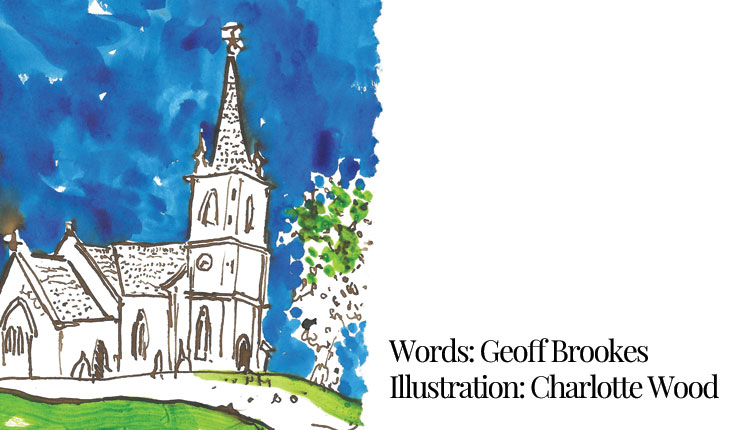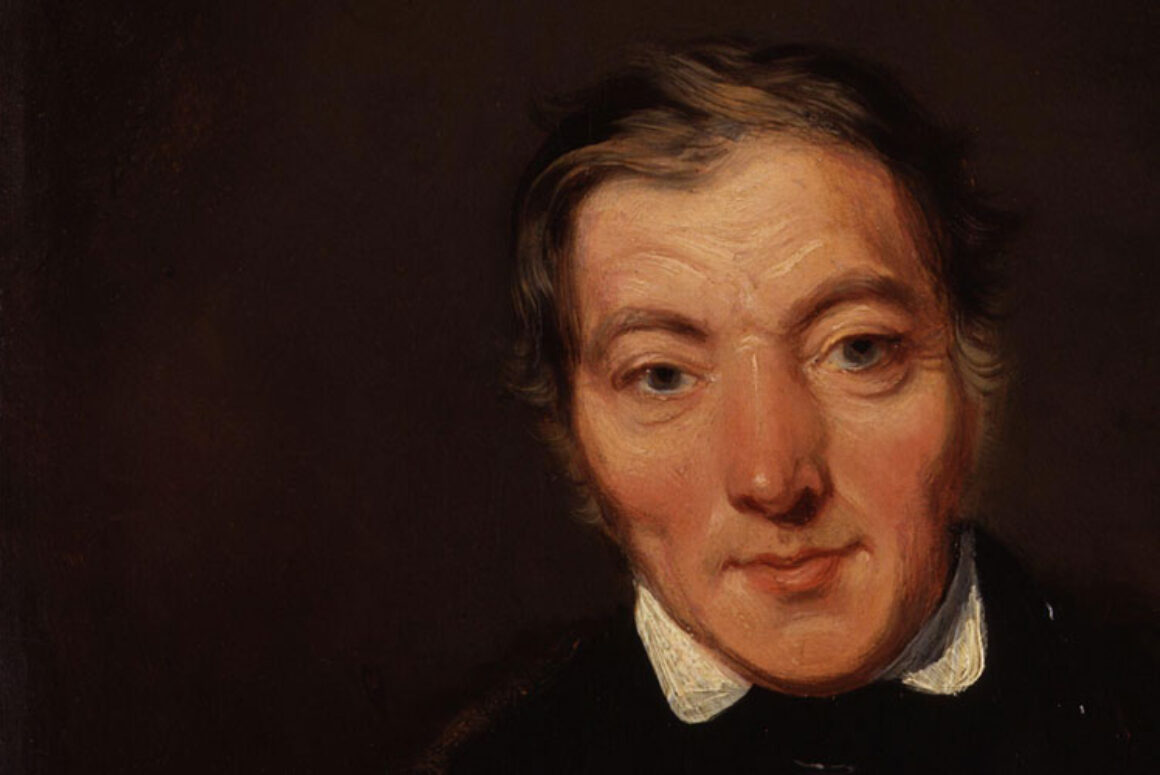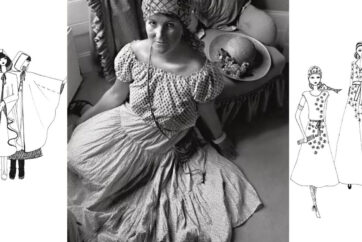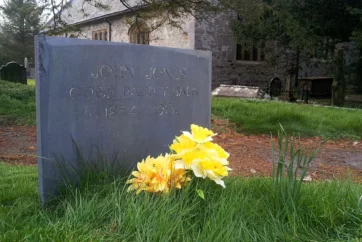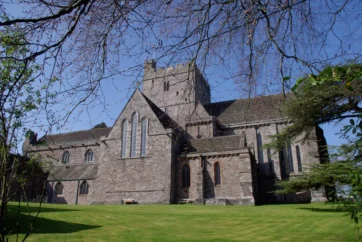![]()
The stone over his grave in the old churchyard was a very plain structure and the spot presented a very desolate and deserted appearance. Now all is changed, and henceforth Wales will have something worthy of the man to remind her of one of its noblest sons.
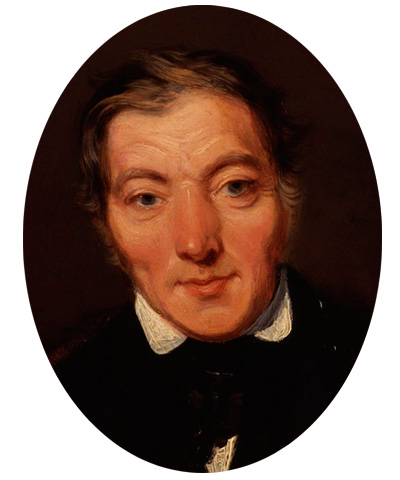
Thankfully we can still see the benefits of this work today. On Saturday 12 July 1902 “co-operators from all parts of the country” met in St Mary’s churchyard in Newtown to honour the memory of Robert Owen and the restoration of his tomb. It’s a job well done: railings, inscription, image and frieze. All for Robert Owen. All deserved.
Is he the greatest Welshman of them all? Well that is what some people believe. Without doubt he was one of the most significant figures of the nineteenth century. Socialist, philanthropist, visionary, co-operator – he was all of these – and more. Owen was born in Newtown, he was buried in Newtown and his alternative social vision has reached out across the world, touching the lives of millions. There are those who know of him, but who know nothing of Wales.
He was born in 1771 and was the sixth of seven children. Like so many people, his intellectual liberation came through reading and the emancipation that education and reading could bring was an idea which never left him.
At the age of ten he left home with his eldest brother William and found a job as an apprentice in a drapery business in Stamford. This simple step formed the whole direction of his life. He took up a similar post in London and then when he was sixteen he moved to Manchester.
He found himself quite by chance in a hub of the industrial revolution at a key moment in its development. He was quick to seize opportunity and with money borrowed from William, he established a business manufacturing machine tools, making the machines that made the cotton. Then he put the knowledge he had acquired to practical use by setting up as a cotton spinner, soon winning a reputation amongst his peers for producing fine yarns.
He eventually became a partner in the Chorlton Twist Company which purchased mills in New Lanark near Glasgow from David Dale. These mills employed over 1,500 people, including 500 children and by 1800 it was the largest cotton-spinning development in the country. David Dale was regarded as a progressive employer, concerned to protecting the well-being of children and he had been keen to sell the mills to someone who shared the same commitment. Children were frequently killed or seriously injured in industrial accidents and there was increasing unease at their exploitation. Dale found that person in Robert Owen, who went on to marry his daughter Caroline.
The emphasis at New Lanark on the well-being of workers, established Owen’s reputation as a philanthropist. He was responsible for introducing increased hygiene standards and for the development of an infant school and a store. He won the trust of his workers by continuing to pay them for 4 months when cotton production stopped in most mills during the 1806 American embargo on exports. Owen didn’t just talk about his ideals. He did practical things to make things better for others.
“The emphasis at New Lanarck on the well-being of workers, established Owen’s reputation as a philanthropist”
I arranged superior stores and shops, from which to supply every article of food, clothing etc. which they required. I bought everything in the first markets on a large scale and had articles of the best quality supplied to the people at cost price. This saved them a full twenty-five per cent. The effects soon became visible in their improved health and superior dress and in the general comfort of their houses.
This was an alternative to the ‘truck system’. Some employers paid their workers not with currency but with tokens, a system endemic in the ironworks in Wales. These tokens had no value at all except in the owner’s ‘truck shop’. Consequently they could sell second-rate produce and charge high prices to workers who had little or no choice about where they could shop. This was a notorious abuse which was eventually banned by Parliament. But it was Robert Owen who showed them the way; in his stores, workers had access to good quality goods at wholesale cost. These principles underpinned the subsequent growth of the co-operative movement and it is one of the reasons why Owen has been so highly regarded.
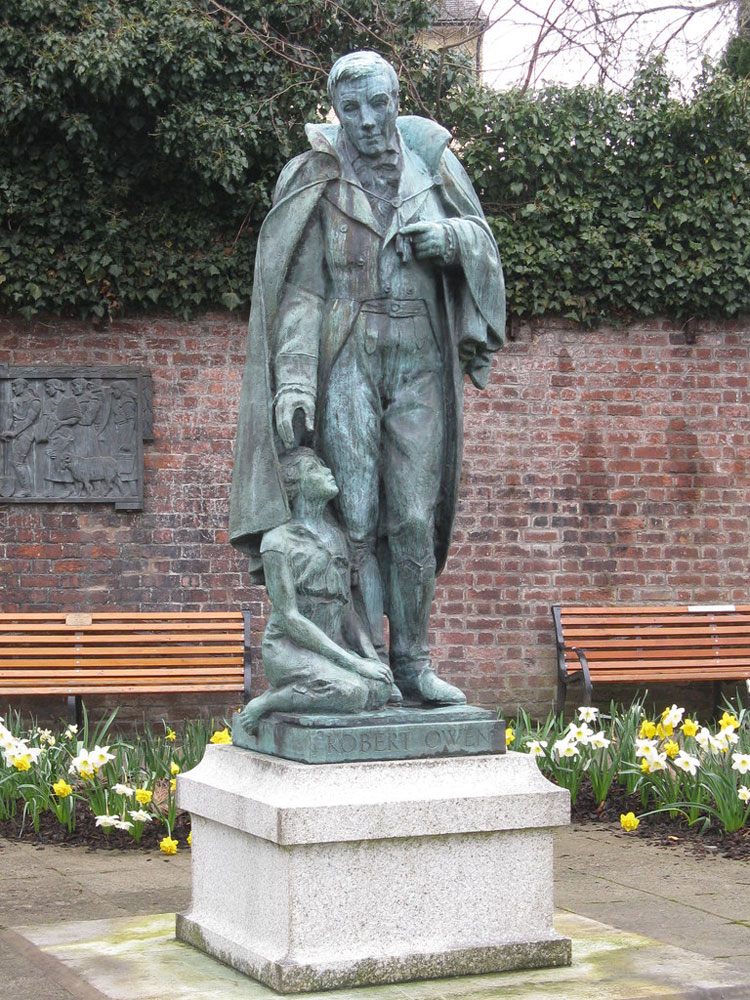
He promoted the idea of the eight-hour day, with the slogan: “Eight hours labour, Eight hours recreation, Eight hours rest” which seems a reasonable way of organising your time.
He also developed a self-monitored system to measure workers performance called the ‘silent monitor‘, which was a concept a long way ahead of its time. He removed threats and intimidation as a means of improving performance, replacing it with a sense of pride in a job done properly. The ‘silent monitor’ was a four-sided piece of wood which hung prominently at a work-station, each side a different colour. The side displayed the colour which corresponded to the workers performance the previous day. Black signified bad, blue meant indifferent, yellow represented good and white excellent. The colour displayed effectively projected your performance and your self-worth to the world. Owen observed that: It was gratifying to observe the new spirit created by these silent monitors. At the commencement, the great majority were black; they were gradually succeeded by blue, and then by yellow, and some white. This was truly a triumph of management.
New Lanark attracted much attention with a stream of prominent visitors and Owen continued to develop his belief in ‘villages of co-operation’ when he bought New Harmony in Indiana in America where he hoped the workers would eventually become a self-governing community. It was an alternative image of social development. There was agriculture, small industries and community buildings and for a while Owen travelled between the two communities in America and Scotland. However, whilst many went there, not all the new residents of New Harmony had the skills required to generate an income. Sadly the project ultimately failed.
Back in Scotland, despite the fact that business prospered, he faced constant opposition from his partners. Eventually Owen ended his connection with New Lanark in 1828. His said to a partner William Allen, “All the world is queer save thee and me, and even thou art a little queer.” a point of view with which I have always had some sympathy.
Owen remained convinced that an individual’s character was formed entirely by the effects of their environment. Education would create rational and humane individuals and thus establish an environment in which a child could develop under what he regarded as proper influences. Education was always at the heart of all his beliefs.
He opened the National Equitable Labour Exchange where ‘labour notes’ valued in hours could be exchanged for merchandise and he became involved in the developing trade union movement. His commitment to radical socialist ideals remained constant right up to his death.
Returning to Newtown from a meeting in Liverpool, he fell ill whilst staying at the Bear Hotel. In the evening he asked the Rector to convene a meeting at which he would speak on the necessary reform of education but died the next morning, 17 November 1858. Despite the protests of supporters, he was given a Christian burial.
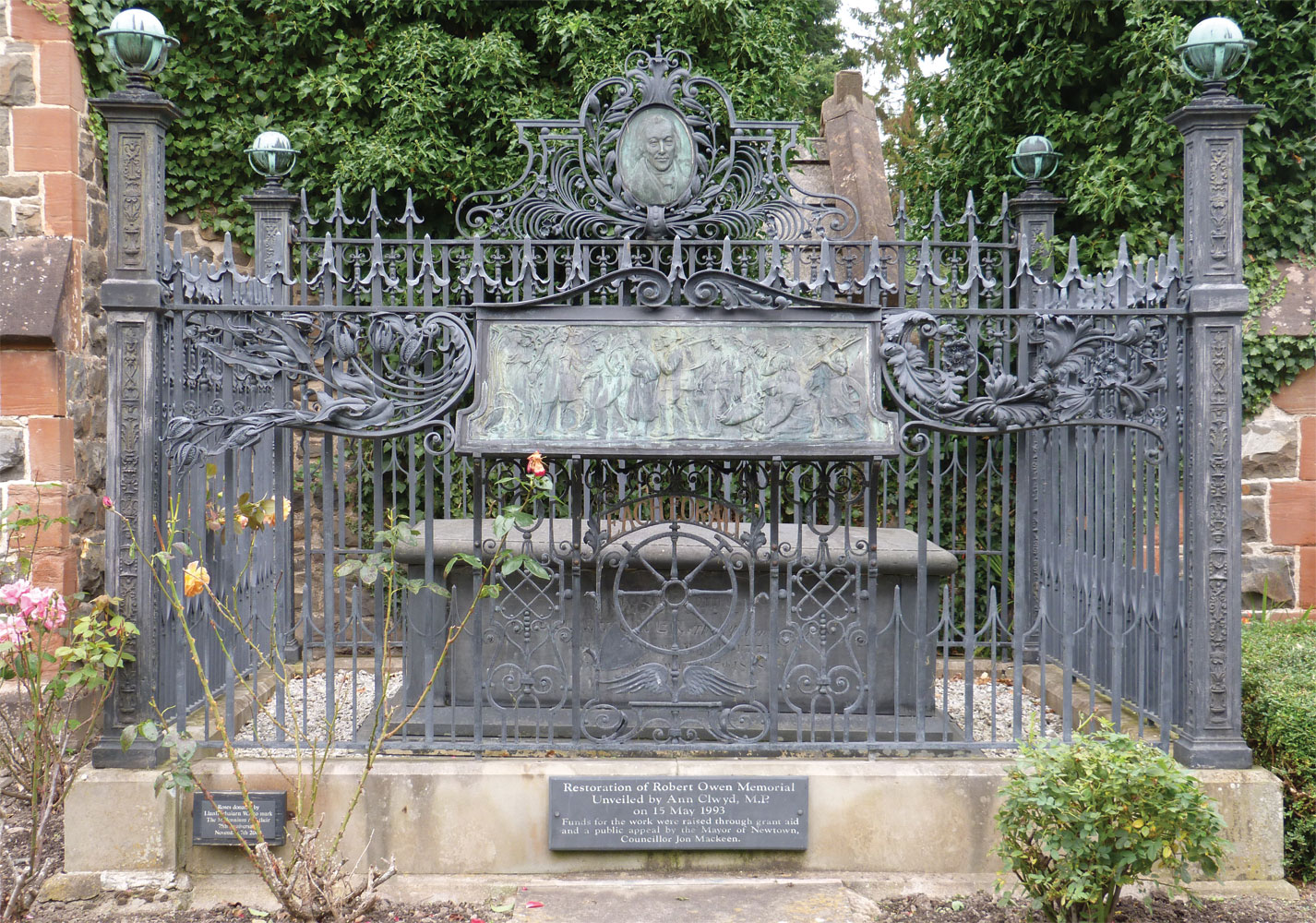
On the ground floor of the Council Offices in Newtown there is the fine Robert Owen Museum which is essential for all visitors to Newtown. It gives a fascinating picture of a fascinating and influential man. The plaster cast of the ‘life mask’ they have there, made when Owen was fifty, brings you closer to the reality of the man behind the vision.
His grave which he shares with his parents, Anne and Robert, has been twice restored. It was surrounded by fine ornate railings erected by the Co-operative Movement in 1902, which give it the prominence the grave deserves and it was all spruced up again in 1993. You can find the tomb in the churchyard of St Mary’s in the middle of Newtown and there is a fine statue too erected in 1956 in a garden on Shortbridge Street. There is also a copy of this statue outside the Co-operative Bank headquarters on Balloon Street in Manchester.
Robert Owen had a paternalistic desire to influence and improve the lives of others by promoting combination of co-operation and self-help. In some ways he remained a paradox – he was a successful capitalist who believed in worker control – but he never lost his belief in the essential goodness of humanity. As it says on his tomb, “It is the one great universal interest of the human race to be cordially united and to aid each other to the full extent of their capacities.”
But it seems to me that the most touching words of all were those of his friends who said on his death “a grave is too cold and damp for a soul so warm and true.”
